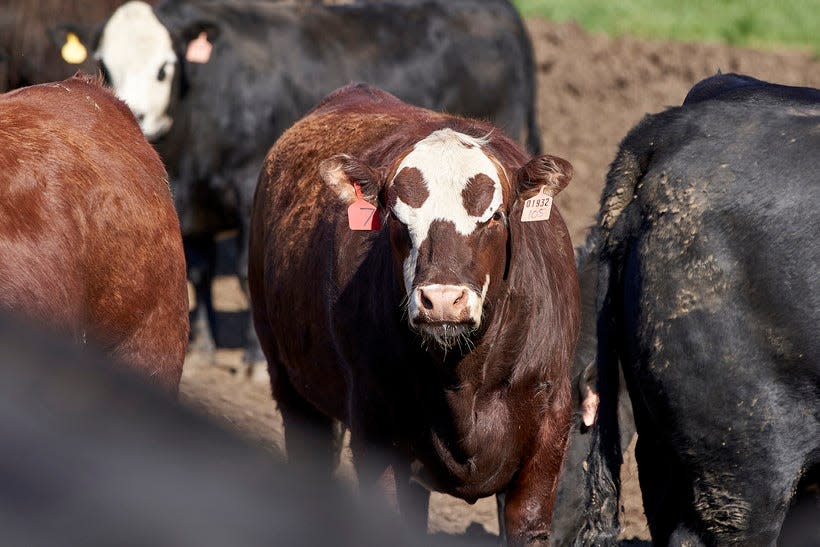Iowa animal waste hauler fined again for illegal field spreading

A southwest Iowa company that transports and disposes of partially digested food from the stomachs of slaughtered animals was recently fined again for improperly spreading the material on fields, according to the Iowa Department of Natural Resources.
Feedlot Service Company of Neola and its owner, Fred Roane, agreed this month to pay a $7,000 fine for disposing of the material on terrain that is too hilly and too close to a water well, a recent DNR order said. It’s the second time in about two years that the department fined the company.
The company operates an open cattle feedlot with about 1,500 animals but also hauls paunch manure from a cattle slaughterhouse in Omaha, Nebraska, DNR records show.
Paunch manure is extracted from the digestive tracts of slaughtered animals and has historically been treated as a waste product, according to the U.S. Environmental Protection Agency. Cows often contain about 50 pounds of partially digested food.
In recent years, some have sought to use it as feed, compost, or to produce biofuels. Feedlot Service Company spreads it on fields, where it decomposes. It is considered a solid waste in Iowa.
Roane told the Iowa Capital Dispatch that he hauls paunch from the Omaha facility almost daily, stockpiles it and periodically applies it to land to help enrich the soil. He said some who live nearby do not like the smell of it and are quick to complain to the DNR.
The company was fined $9,000 in 2021 after the DNR received several complaints about those field applications, including that there were parts of animals in addition to the stomach contents.
“During the investigations I observed numerous dead animal parts, including cow hooves, bellies, hearts, hides, tails, chunks of flesh, bones, other unknown parts of animals, and other forms of solid waste items,” Alison Manz, a senior environmental specialist for the DNR, wrote in a March 2021 investigation report.
It’s illegal in Iowa to dispose of animal carcasses or their parts by strewing them across fields.
Roane told the DNR it was an “isolated incident” in his more than 30 years of hauling paunch that was caused by a confluence of factors, including changes at the slaughterhouse and his company’s failure to fully inspect what it was hauling, DNR records show. He produced a stack of receipts to show that he had routinely disposed of animal parts at a landfill.
But the DNR noted several other violations, including applying too much paunch manure to the fields and in places that were too hilly or too close to drinking water wells. The department also found that contaminated water from paunch manure and cattle manure at the feedlot had flowed into a nearby creek.
In a September 2021 agreement with the DNR, Roane did not admit wrongdoing but agreed to pay the fine, comply with state rules, and keep better documentation of the materials he hauls and applies.
However, in February 2023, someone made an anonymous complaint to the DNR that the company had again spread paunch on hilly terrain and too close to a well. The department’s subsequent investigation confirmed that and noted paunch in a roadside ditch and along the embankment of the nearby creek.
“The inadequate application and management depict a lack of consideration for the environment,” according to a recent DNR order. “Evidence was observed that paunch manure had migrated to the water’s edge of Keg Creek.”
Roane told Capital Dispatch he erred by spreading paunch slightly too far onto more steeply sloped ground but said the well has been abandoned and shouldn’t be a concern for contamination.
As part of the order, Roane again didn’t admit wrongdoing but agreed to abide by state regulations and pay a $7,000 fine, which Roane described as “the cost of doing business” in an interview. He said passersby who see potential violations should contact him instead of the DNR, so that he can fix the problems without an investigation and fines.
Those administrative fines are capped at $10,000 by state law. Higher amounts can be sought in court.
Find this story at Iowa Capital Dispatch, which is part of States Newsroom, a network of news bureaus supported by grants and a coalition of donors as a 501c(3) public charity. Iowa Capital Dispatch maintains editorial independence. Contact Editor Kathie Obradovich for questions: kobradovich@iowacapitaldispatch.com.
This article originally appeared on Sioux Falls Argus Leader: Animal waste hauler fined again for illegal field spreading

